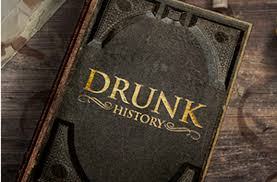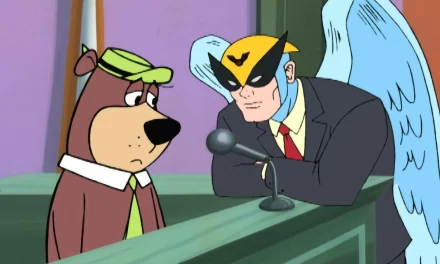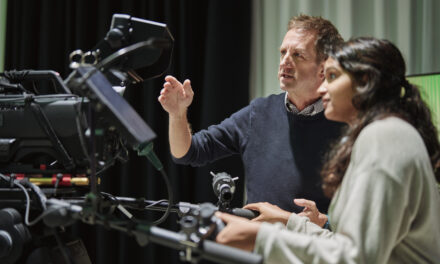Author’s note: Today’s Secret Word is […].
Whenever you see the word […] below, in honor of Paul Reubens, scream real loud.
I was at WMNJ, Drew University’s student radio station, helping a student prep some new field recorders when the news of Paul Reubens’ death was announced. “Oh,” I exclaimed, as one typically does when a childhood icon passes, “Pee-wee Herman died.” When I sensed my student’s uncertainty at something the professor just said, I attempted a sufficiently professorial explanation:
Paul Reubens. He was a member of the comedy troupe, the Groundlings, and perhaps better known by his alter-ego, Pee-wee Herman, who was an only-in-the-80s character – a sort of man-boy in a flat-top haircut who always wore a grey plaid suit and a bright red bowtie, and had this nasally voice and ear-splitting, har-har-ing laugh. He was a kid’s character, but he wasn’t for kids, at least not at first. He had a famous HBO special back in 1980, The Pee-wee Herman Show, which was all dressed out as a kid’s show, but was definitely for adults, and full of all of the raunchy humor and innuendo that you might expect when adults take over a children’s genre and pump it full of irony.
Then, beginning in 1985, Pee-wee began to transition to more of a kid’s character, but certainly a bizarre and offbeat one, with the release of the Tim Burton-directed feature film, Pee-wee’s Big Adventure, which was about a rad (that’s 80s-speak for “lit”) bike, and had a scene that used to scare the bejesus out of me when I was a kid – and still does a little bit.
Tell them Large Marge sent you.
But I think it was Pee-wee’s Playhouse (1986-1991), a 30-minute show actually meant for kids and modeled on children’s shows of the 1950s, for which Reubens is most remembered. It came on CBS on Saturday mornings, right in the heart the network’s slate of Saturday morning cartoons, alongside Jim Henson’s Muppet Babies (1984-1991), Mighty Mouse: The New Adventures (1987-1988), and Garfield and Friends (1988-1985). And it was this manic, wacky, campy show, but in was manic and wacky in the most sincere, heartfelt, and humane way.
It was loud, too. There was lots of screaming – especially after someone had accidentally said the day’s Secret Word.
The playhouse itself was a postmodern pastiche of architectural styles (and certainly wasn’t structurally sound), all capped off with blinking sphinx and a giant neon sign proclaiming to all in Puppetland that the place was Pee-wee’s. The interior design was a weird amalgam of Memphis and Googie style, and nearly every piece of furniture, every object, and toy inside was an anthropomorphized character: There was Chairry, the chair; Floory, the floor; Mr. Window … well, you get the idea. Then there was the puppet jazz band; Conky, the robot, who at the beginning of each episode generated the all-important Secret Word; Terry the Pterodactyl, a kite, a cow, a rude boy puppet, a magic screen, a globe, and a whole collection of other puppets and Claymation characters, each of whom had their own special play routines with Pee-wee.
There were also a handful of human and semi-human characters who stopped by, or, like Jambi the Genie (played by Phil Hartman in the HBO special, but by John Paragon in the TV series), lived at the playhouse, some reprising roles from The Pee-wee Herman Show: there was the bouffonted Miss Yvonne, “The Prettiest Lady in Puppetland” (Lynne Marie Stewart); Cowboy Curtis (Laurence Fishburne – yes!); Captain Carl (Hartman); and Reba the Mail Lady (S. Epatha Merkerson).
And that’s not even getting into all of the weird and ancient cartoon shorts Pee-wee and his friend the King of Cartoons (Gilbert Lewis/William Marshall) used to play (my favorite was the Spanish-language, perhaps El Greco-inspired, El Hombre).
As I was delivering this disquisition (more or less – the actual conversation may have been slightly different), my student had Googled the name and found a few pictures that spurred recognition, and, I flatter myself to think, had a new appreciation for a bit of Dr. S’s 1980s and 1990s pop culture obscurities.
As for me, since the news of Reubens’ death, I’ve been indulging my own nostalgia by consuming as much Playhouse content as free time will allow. And from the hilltop of 2023, I’ve realized that, not only was the show remarkably diverse and progressive for its vintage, refusing (some) stereotypical racial and gender representations, as others have noted; but that Pee-wee’s Playhouse might be identified among the rhizomes feeding the so-called millennial humor; or, to be more precise, the humor of the liminal “Xennial” cohort born, as I was, between 1978 and 1983, and which the writer Anna Garvey has quite accurately called the Oregon Trail Generation. We would have been impressionable, between the ages of 3 and 8, when the first season of Pee-wee’s Playhouse first went to air, and its sense of humaneness and joyous mayhem may have prepared us for the disjointed world we would inherit far more than we might have realized.
Characterized by the surreal and the “horrifically absurd,” millennial humor, according to The Guardian’s Rachel Aroesti, can be traced from the birth of Adult Swim in 2001, through The Eric Andre Show (2012 – ), Rick and Morty (2013 – ), BoJack Horseman (2014-2020), and Broad City (2014-2019), (I’ll throw Drunk History into the mix) and is dominated by a sense of existential bleakness overlaid with “chaotically strange plotlines,” “unsettling weirdness,” and “aggressively odd scenarios.” In these shows, Aroesti writes, the laughs can come more from absurdist aesthetics (form) than “actual jokes” (content), which are “largely unnecessary.” Millennial humor, in other words, often seems bleak, or chaotic, or cringey, or weird purely for the sake of it.
Absent the bleakness, many of the elements of this comic sensibility – the randomness, the absurdities, the surreal oddities – can be glimpsed, in suitably child-friendly form, in Pee Wee’s Playhouse.
Consider, for example, the episode where Pee-wee marries a bowl of fruit salad; or the playful scenes performed by the Claymation characters who live inside the playhouse refrigerator; or the random beefcakes; the giant ball of foil, the chroma key Magic Screen sequences, or that each episode ends with Pee-wee riding his souped-up scooter through the playhouse wall and out into the “real world” (really, a chroma key loop of old street and highway B-roll).
In what might have been an acknowledgement of the show’s millennial comic sensibilities as much as an affirmation of its singularity, Neil Genzlinger, in his obituary for Reubens in the New York Times, explained that “the show was a world away from standard educational TV for children – its lessons, if any, were delivered through wackiness rather than didactically, and its presentation was decidedly nonlinear.”
Ask why millennial humor is so dark and weird, and you might conclude, as Washington Post opinion columnist Elizabeth Bruenig accurately explained in a 2014 reflection, that its apparent nihilism, its mix of horror and humor, derives from a generational sense that the reality of the world denies coherent meaning. Citing studies and think pieces suggesting what members of our generation know anecdotally to be true, Bruenig explains how received moral, social, and economic structures (i.e., religion, family formation, stable careers, expectations of a greater quality of life than our forebearers) no longer hold purchase for a generation that has experienced, for instance, information overload, unending wars, financial crises and economic collapse, active shooter drills, and (oh, for shits and giggles:) the radical disorientations of neoliberal subjectivity.
Amid such trends, Bruenig writes, “a particular style of expression has spread among young people. Rather than trying to restore meaning and sense where they’ve gone missing, the style aims to play with the moods and emotions of an illegible world. In a way, it’s a digital update to the surreal and absurd genres of art and literature that characterized the tumultuous early twentieth century.”
The horror and the humor in millennial comedy, in other words, acts as something of a defense mechanism in a world that, as Albert Camus once wrote, maintains an “unreasonable silence” that defies the human need for meaning.
But acknowledging the meaninglessness of the world does not necessarily a nihilist make (though it can). Instead, a recognition that all of us humans are generally in the same boat – the same stew of meaninglessness – might lead to a sense of empathy for one another.
For all its proto-Millennial wackiness, this type of ethics, the ethics of reciprocity, was the beating heart of Pee-wee’s Playhouse. Explaining his vision to Time magazine on the occasion of the show’s 2006 syndication on Adult Swim, Reuben had said that he wanted it “to have a strong moral backbone and be something kids could really get immersed in … we were out to educate kids, teach them about the golden rule and to celebrate the differences in each other. I was trying to be all-inclusive.”
Over the past week, of all of the Playhouse episodes and clips I’ve watched, I think my favorite scene was from the beginning of the Season 1 episode, “Rainy Day” (1986), in which Pee-wee comforts a trembling Terry, who is frightened of the thunder and cowering under a bunk bed. To calm his friend, Pee-wee gently draws him out and strokes his stomach until he falls asleep. In the face of sublime natural terror and the inevitable vicissitudes of life, the message goes, we can comfort those we care for.
https://youtube.com/watch?v=f4Rpz5FoIOE
It may be that this is the missing affect for which millennial sensibilities pine; and this is how I will remember Pee-wee.
Andrew J. Salvati is is an Adjunct Assistant Professor in the Media and Communications program at Drew University where he teaches courses on podcasting, media, and television studies. His research interests include media and cultural memory, television history, and mediated masculinities. He is currently working on a manuscript entitled Our Victorious Crusade: World War II as Television Epic, 1949-1953.











